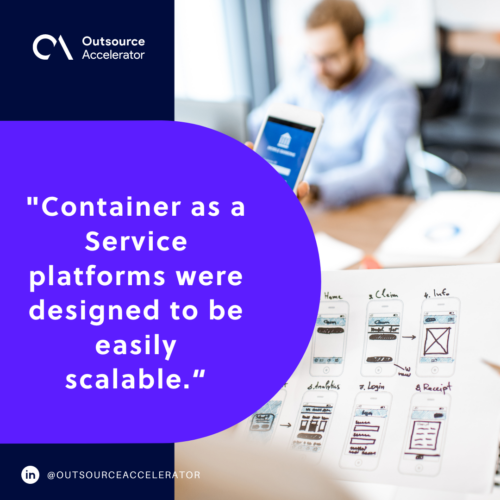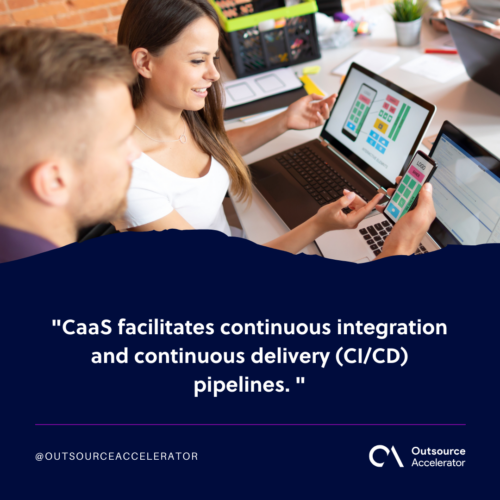Container as a Service (CaaS): How does it work?

Containers have become a pervasive technology in application development. They allow developers to package and deploy their applications easily, consistently, and reproducibly.
However, managing and scaling these containers can be a challenge.
Container as a Service (CaaS), a cloud computing service model, offers a simplified approach to container orchestration. Developers can instead focus on crafting solutions without worrying about the infrastructure.
In this article, we’ll look at the different ways that CaaS works and its benefits for your IT operations.
What is a Container as a Service?
Containers are encapsulated and portable software units that contain code and all its dependencies. They’ve gained immense popularity for their ability to ensure consistency across different environments.
Container as a Service is a cloud-based service that allows software developers and IT departments to manage and deploy containers at scale easily. Due to its cloud-based nature, users don’t have to deal with infrastructure management and maintenance.
CaaS providers take care of container management, including networking, storage, and security.
How does Container as a Service work?
Containers hold all the configurations that applications require to run properly, including logic, dependencies, and code.
CaaS aims to help organizations manage their containerized apps in a safe and scalable manner. The containers are packaged with all the necessary components, similar to virtual machines, that allow them to operate applications in isolation.
Developers can upload their container images to the cloud service, and the CaaS provider takes care of running those containers.
It may handle tasks like:
- Container orchestration
- Scaling
- Integrated monitoring and logging
- Lifecycle management
The provider may also offer tools and APIs for developers to interact with the containers and control their deployment.
Benefits of Container as a Service
Container as a Service offers a range of benefits that contribute to the efficiency and agility of application deployment in modern IT environments.
Some key advantages include:
Simplified management and deployment
The Container as a Service platform provides a centralized and user-friendly interface for management. It abstracts away infrastructure complexities, making it easier to set up containerized applications.
This enables faster release cycles, accelerated application development, and reduced time to market.
Resource efficiency
CaaS allows for efficient utilization of computing resources by packing multiple containers onto a single host. This helps optimize resource allocation and reduces infrastructure costs.
This efficiency also translates to faster startup times and the ability to run more containers on a given set of resources.
Scalability
Container as a Service platforms were designed to be easily scalable.

They even provide features like automated scaling capabilities. These elements adjust the number of containers based on workload demands, making it easier for applications to scale up or down.
CaaS ensures optimal resource utilization and performance, especially during periods of increased traffic.
Portability
Containers are portable, meaning they can be easily moved between systems without significant reconfiguration. This makes it possible for apps to function reliably in various environments.
CaaS makes it easy to transfer containers between different infrastructures, including on-premises and cloud environments. IT departments won’t need to worry about compatibility issues.
Flexibility and agility
CaaS enables a more agile development and release process.
CaaS providers offer features like:
- Self-service provisioning
- Automated scaling
- Simplified management interfaces
These capabilities enhance teams’ efficiency so they can focus on application development.
Isolation and security
Containers provide a level of isolation, ensuring that applications run independently of each other. This containerized isolation boosts security by preventing interference between applications, reducing the risk of vulnerabilities affecting other containers.
Container as a service providers
Here are the most notable CaaS providers:
Amazon Elastic Container Service (Amazon ECS)
Amazon ECS is a highly secure, reliable, and scalable container orchestration service. Developers can efficiently manage applications both in the cloud and on-premises.
With Amazon ECS, users can launch containers at scale without needing to worry about the underlying infrastructure. The service offers automatic scaling and pay-as-you-go pricing across multiple AWS compute options.
Azure Container Instances (ACI)
Microsoft Azure offers this Container as a Service that enables users to deploy containers in seconds, eliminating the need to provision virtual machines.
ACI provides a lightweight, serverless environment for containerized applications, allowing developers to fully focus on their code. It also integrates well with other services in the Azure ecosystem.
Google Kubernetes Engine (GKE)
GKE, offered by Google Cloud, supplies automated tooling and infrastructure to assist developers with their containerized application development. By streamlining deployment, it reduces the burden on developers and IT teams.
Google makes it easy for users such that little to no Kubernetes expertise is required to run the CaaS platform.
When to use container as a service
Container as a Service can be beneficial in various scenarios, including the following:
Application development and testing
Container as a Service platforms are ideal for developers who want to quickly spin up containerized environments.
These are also well-suited for stateless applications, which store data externally and thus can operate within containers that don’t rely on persistent storage.
Microservices architecture
CaaS creates an efficient way to manage and orchestrate microservices-based architectures. Here, applications are decomposed into smaller, independently deployable services.
Hybrid and multi-cloud environments
CaaS platforms often support hybrid and multi-cloud deployments. This makes it flexible for organizations with diverse infrastructure needs or those transitioning to cloud environments.
CI/CD pipelines
CaaS facilitates continuous integration and continuous delivery (CI/CD) pipelines. It does so by providing a standard and portable environment for testing and releasing applications.
Developers are guaranteed consistency and reproducibility across different stages of the development lifecycle.

Migration and modernization
Container as a Service can be useful for organizations looking to modernize existing applications or migrate them to a containerized environment.
It simplifies the process of containerizing legacy applications and provides a scalable and manageable infrastructure for running them.
DevOps practices
Container as a Service aligns well with DevOps practices by fostering collaboration between development and operations teams. The CaaS standardized environment streamlines the development and deployment processes, leading to faster releases and improved collaboration.
Cost optimization
A Container as a Service model allows organizations to optimize resource usage, avoiding over-provisioning and providing cost savings.
The ability to scale resources based on demand contributes to efficient resource allocation and cost-effective infrastructure management.
Assess your application’s specific needs and requirements before adopting a CaaS solution.
Evaluating your development and deployment process will help determine whether Container as a Service is the right fit for your software needs.







 Independent
Independent




